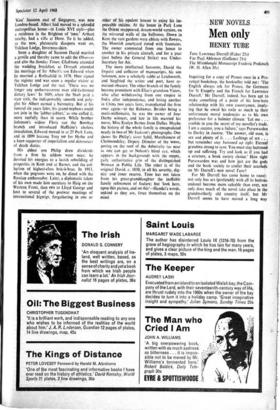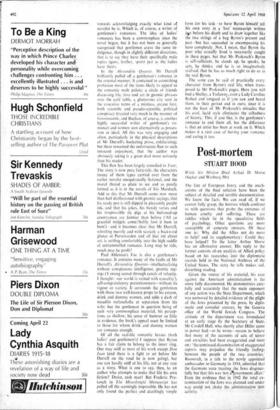NEW NOVELS
Men only
HENRY TUBE
Tune Lawrence Durrell (Faber 25s) Vac Paul Ableman (Gollancz 21s) The Misolonghi Manuscript Frederic Prokosch (W. H. Allen 30s)
Inquiring for a copy of Proust once in a Pro- vencal bookshop. the bookseller told me: The English always ask for Proust, the Germans for St Exup6ry and the French for Lawrence Durrell.' Mr Durrell, indeed, has been apt to make something of a point of his love-hate relationship with his own countrymen, imply- ing that he owed his exile as much to their unfortunate moral tendencies as to his own preference for a balmier climate. 'Let me . . . confide in you the secret of my novelist's trade. I am a success, you a failure,' says Pursewarden to Darley in Justine. 'The answer, old man, is sex and plenty of it. . . . Lashings of sex ... but remember stay buttoned up tight. Eternal grandma strong to save. You must stay buttoned up and suffering. Try and look as if you had a stricture, a book society choice.' How right Pursewarden was and how just are the gods and the book society to confer their accolade on Mr Durrell's new novel Tune!
For Mr Durrell has come home to roost: not only has sex (preferably with alt its buttons undone) become more saleable than ever, not only does much of the novel take place in the grandmotherly old country itself, but Mr Durrell seems to have moved a long way
towards acknowledging exactly what kind of novelist he is. Which is, of course, a writer of gentlemen's romances. The idea of ladies' romances has been a commonplace since the novel began, but it has not been so generally recognised that gentlemen crave the same in- dulgence, though in slightly different directions, that is to say they have their specifically male topics (guns, leather, sport) just as the ladies have theirs.
In the Alexandria Quartet, Mr Durrell brilliantly pulled off a gentleman's romance in the oriental manner. It contained in astonishing profusion most of the items likely to appeal to the romantic male palate; a circle of friends discussing life, love and art in gnomic phrases over the cafe table, a glamorous city seen in the evocative terms of a mistress, arcane lore, both scientific and pseudo-scientific, political conspiracy (treated very much in the manner of Greenmantle, and Buchan, of course, is another highly successful writer of gentlemen's ro- mance) and women seen alternatively as posses- sion or ideal. All this was very engaging and often, particularly in the physical descriptions of Mr Durrell's bucketing prose, exhilarating; but there remained the unfortunate flaw to such innocent enjoyment, that the author was obviously taking it a great deal more seriously than his reader.
This flaw has been largely remedied in Tune. The story is now pure fairy-tale, the characters (many of them types carried over from the earlier novels) unequivocally fictional, and the moral thread as plain to see and as purely formal as it is in the novels of Iris Murdoch. Add to this that Mr Durrell seems now more than half disillusioned with gnomic sayings, that his ready pen is still dipped in pleasantly purple ink, and that his jokes, his bawdy verses and his irrepressible sly digs at his buttoned-up countrymen are funnier than before (`All ye graceful midgets come/Softly foot it bum to bum')—and it becomes clear that Mr Durrell, whistling merrily and with scarcely a backward glance at Pursewarden and all that rot about art, is settling comfortably into the high saddle of untrammelled romance. Long may he ride, much may he profit!
Paul Ableman's Vac is also a gentleman's romance. It contains many of the faults of Mr Durrell's Alexandria Quartet—intellectualising without conspicuous intelligence, gnomic say- ings ('1 swung seated through canals of velocity. I thought : our world is veined with causality'), self-congratulatory pretentiousness—without its vigour or variety. It surrounds the gentleman with those two well-known props to his esteem, drink and dummy women, and adds a dash of maudlin melancholia at separation from his wife; but the gentleman in question being of such very commonplace material, his percep- tions so shallow, his sense of humour so little in evidence, the book's appeal must be limited to those for whom drink and dummy women are romance enough.
Of all the real-life romantic heroes (both ladies' and gentlemen's) I suppose that Byron has a fair claim to belong to the inner ring. One may sniff at most of his work except Don Juan (and there is a light to set before Mr Durrell on the road he is now going), but one can hardly sniff at his life, not at any rate as a story. What is one to say, then, to an author who attempts to make that life his own fiction? Desist, rash man! But Frederic Pro- kosch in The Missolonghi Manuscript has pulled off the seemingly impossible. He has not only found the perfect and dazzlingly simple form for his task--to have Byron himself tell his own story in a 'lost' manuscript written jtiist before his death and to draw together like the two strings of a bag Byron's present and past—but has. succeeded in encompassing his hero completely. Not, I mean, that Byron the poet who actually lived is necessarily caught in these pages, but that Mr Prokosch's Byron is self-sufficient, he stands up, he speaks, he acts, he thinks; and he is so imaginatively realised, that he has as much right to do so as the real Byron.
The same can be said of practically every character from Byron's real life, when trans- posed to Mr Prokosch's pages. Here you will find a Shelley, a Trelawny, even 'a Lady Caroline fleshed and tongued as if you saw and heard them, in their period and in ours; since it is not the least of Mr Prokosch's miracles that his cool, lucid style eliminates the stiltedness of history. This, if you like, is the gentlemen's romance to end' them all, but the difference is that an artist has been at work on it. Which makes it a rare case of having your romance and eating it too.











































 Previous page
Previous page